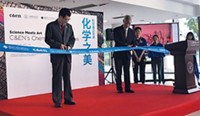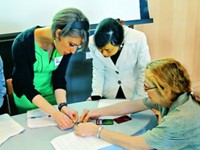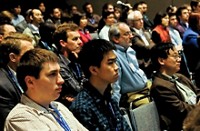Advertisement
Grab your lab coat. Let's get started
Welcome!
Welcome!
Create an account below to get 6 C&EN articles per month, receive newsletters and more - all free.
It seems this is your first time logging in online. Please enter the following information to continue.
As an ACS member you automatically get access to this site. All we need is few more details to create your reading experience.
Not you? Sign in with a different account.
Not you? Sign in with a different account.
ERROR 1
ERROR 1
ERROR 2
ERROR 2
ERROR 2
ERROR 2
ERROR 2
Password and Confirm password must match.
If you have an ACS member number, please enter it here so we can link this account to your membership. (optional)
ERROR 2
ACS values your privacy. By submitting your information, you are gaining access to C&EN and subscribing to our weekly newsletter. We use the information you provide to make your reading experience better, and we will never sell your data to third party members.
Environment
Academic Chemists Cement Global Ties
Leaders of U.S., Chinese chemistry departments meet in Beijing to share experiences
by Jessie Jiang
July 20, 2009
| A version of this story appeared in
Volume 87, Issue 29

A team of seven chemistry department administrators from the U.S. met with their counterparts from 16 Chinese universities this week in Beijing. Organized by Peking, Tsinghua, and Nanjing Universities and sponsored by the National Science Foundation of China and China's Ministry of Education, the meeting came as a sequel to five Chinese deans' visit to the U.S. back in 2008 (C&EN, March 10, 2008, page 76).
During the two-day conference titled "China-U.S. Deans/Chairs Forum on Chemical Research and Education," attendees from both countries shared their experiences in faculty recruitment, research, education, and administrative support, provoking thought and at times long applauses at this rare gathering. The U.S. delegation also toured labs and chatted with students at Peking and Tsinghua Universities, where two of the country's best chemistry programs are based.
The American universities represented were University of California, San Diego; Colorado State University; Columbia University; University of Illinois, Urbana-Champaign; University of Michigan; University of Tennessee; and University of Wisconsin, Madison.
"This trip will give our administrators a direct understanding of top Chinese chemistry departments, which are now on a par with top U.S. institutions on so many levels," said Zi-Ling (Ben) Xue of the University of Tennessee, who helped initiate the program.
"One of the things that strike me the most is the rapid growth happening here," said Carol Fierke, chair of the department of chemistry at the University of Michigan. In China, government funding of chemical research has continued to grow rapidly despite the global economic downturn. But lab facilities and management of those facilities still lag far behind those in the U.S.
"It's interesting that research institutions in the U.S. have solid infrastructures but little funding, while their Chinese counterparts are now facing a completely opposite scenario," said Colin Nuckolls, chair of the chemistry department at Columbia University. "I'm sure we both have a lot to learn from each other."
Andrew A. Gewirth of the University of Illinois, Urbana-Champaign, echoed the point. "Despite the vast differences between our funding systems, it is encouraging to see the Chinese [researchers] getting so much support from their government," he said. "It gives us hope, too."
One of the most discussed issues on the Chinese side was the country's faculty evaluation system, which rates faculty primarily on the basis of the quantity of their research papers and the impact factor of the journals in which they publish. "This has to change," said Zhang Xi, chair of the department of chemistry at Tsinghua University. "We need to realize that the so-called hot subjects change over time, and that a numerical system doesn't guarantee fairness," he explained. Tsinghua is also currently experimenting with a tenure system in the hopes that it might increase interinstitutional job mobility within China.
For Huang Peiqiang of Xiamen University, in southern China, the weeklong program also meant a precious opportunity for networking and boosting his department's international reputation. "While Peking and Tsinghua might be big names to most U.S. schools, not many of our American colleagues know about other high-quality chemistry departments here in China," including Xiamen's, he said. "I hope there will be more such activities in the future."





Join the conversation
Contact the reporter
Submit a Letter to the Editor for publication
Engage with us on Twitter